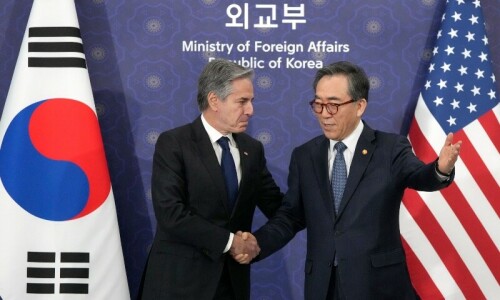UNITED NATIONS: “Pakistan’s national security is linked with its food security, which in turn is directly linked with water security,” argued Khyber Pakhtunkhwa Senator Faisal Saleem Rahman as parliamentarians from more than 60 countries gathered at the UN headquarters to discuss a major global issue — water scarcity.
The two-day event, held in New York this week, was a joint initiative of the UN General Assembly (UNGA) and the Inter-Parliamentary Union (IPU) to raise support for a basic UN Sustainable Development Goal (SDG), access to clean water and sanitation.
The meeting provided parliamentary contribution to the UN Water Conference, which will be held on March 22-24 in New York to suggest practical measures for overcoming the water crisis.
Pakistan used the opportunity to highlight water issues in South Asia, particularly those that have a direct bearing on Pakistan.
The delegation’s leader, Deputy Speaker of the National Assembly Zahid Akram Durrani, told the gathering that while globally water stress levels have remained safe at 18.6 per cent in 2019, South Asia registered high levels of water stress at over 75pc.
And this, he said, was also a cause of alarm for Pakistan which “is estimated to be among the top ten water scarce countries in the world”.
Senator Sana Jamali of Balochistan identified three essential requirements for overcoming the water crisis, “finance, technology, transfer and enhanced international cooperation.”
The upcoming UN conference, she said, must “elevate the water agenda in international discourse so that it receives the attention it deserves”.
Another Balochistan senator, Abdul Qadir, informed that gathering that Pakistan has prioritised investment in this sector to prepare for future climate-related calamities which were growing in frequency and intensity.
Federal Minister for Parliamentary Affairs Murtaza Javed Abbasi informed the meeting that climate change had also become a source of water deficiency.
“International investments are needed for water management, land restoration, reforestation, and for climate resilient cultivation,” he said. “Innovative financing will help create jobs and sport comments and fulfill climate goals.”
Naseema Ehsan, another Balochistan senator, underlined the need for involving women in water management. “This water crisis reaffirms the right of all citizens of Pakistan to equal and affordable access to water as well as to clean drinking water and adequate sanitation facilities,” she said.
The Pakistani delegation explained that Pakistan was working on schemes to protect groundwater through management and technical measures.
Published in Dawn, February 18th, 2023









































Dear visitor, the comments section is undergoing an overhaul and will return soon.